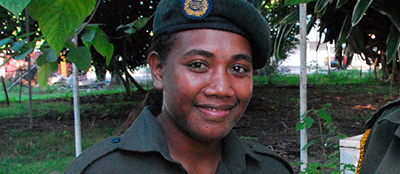The situation in Aceh differs from other conflict environments in that most combatants have remained close to their communities during the conflict, with some never having left their villages. As such, minimal tensions are reported between former combatants and ‘receiving communities’. Reintegration measures have thus focused more on economic reintegration rather than social ...» more
Security & justice
Post-conflict Rehabilitation of Education Services
Education systems can contribute to conflict. In Rwanda, for example, the education system was used as an instrument in fomenting exclusion and hate. In many post-conflict settings, rehabilitation of the education sector requires not re-establishing the system that existed prior to the conflict but rather reforming the whole system. Education rehabilitation goes beyond ...» more
Increased religiosity among women in muslim majority countries
It has hitherto been assumed, at least by western development practitioners, that women's rights are best attained through secularist liberal interpretations of equality, of the sort reflected in conventions such as the Convention on the Elimination of All Forms of Discrimination Against Women (CEDAW). Yet what does increasing use of the veil and greater religious observances ...» more
Prevalence as an Indicator for Anti-forced labour and Anti-sex Trafficking Projects
Prevalence does not seem to be currently used to measure the impact of anti-forced labour, anti-sex trafficking or other anti-slavery projects, although there is no evidence to suggest that it is not a suitable indicator. Instead, the following types of indicators have been used or suggested by experts for measuring the impact of justice interventions: changes in knowledge or ...» more
Organised Crime and Development
Key findngs: Given the nature of organised crime, it is difficult to monitor and accurately measure its prevalence and economic impact. Some of the literature notes that while levels of organised crime have increased in some regions/countries and decreased in others, its global scale remains roughly the same. However, some experts claim that organised crime is on the increase ...» more
Politics of Justice Sector Reform
There are a wealth of case studies available that discuss the impact of politics on justice reform, with less available on how justice reform impacts politics. Most of the resources identified demonstrate how the macro-political environment impacts on the justice sector or explore political dynamics within the sector that affect reform. Less material was found that discusses ...» more
Literature on Yemen
...» more
Underdevelopment and Radicalisation in Bangladesh
While some experts cite poverty as a contributing factor to radicalisation, the vast majority of experts and the literature focus more on political underdevelopment and poor governance; rampant violence, criminality and corruption; non-state service provision by Islamist groups, particularly in education with the expansion of madrassas (religious schools); and the lack of ...» more
Under-development and Radicalisation in Pakistan
Most in-depth analysis has found little evidence of a direct link between poverty and terrorism in Pakistan, arguing instead that terrorism should be seen as a response to political conditions and long-standing feelings of indignity, and frustration at lack of opportunity. Other commentators, however, argue that while this may explain the motivations of the Islamist leadership ...» more
Stability and Development in Sudan – Three Areas
While there has been progress in the Three Areas (relative peace and stability; economic recovery in agriculture; the return of skilled and educated refugees and IDPs), the region remains volatile. Security is still an issue and the presence of land mines hinders recovery and development. Distrust of central government has persisted.The inadequate state of social services and ...» more
Pashtun Tribalism
Pashtuns take immense pride in their independence and have traditionally been fiercely resistant to central rule. Pashtun culture is governed by the ‘Pashtunwali’ which, literally translated as the ‘the way of the Pashtun’, is an unwritten code of honour which is integral to Pashtun identity.Pashtun society faces various challenges today, including the recent influx into ...» more
Social Exclusion Issues in Afghanistan
None of the literature surveyed applies the term ‘social exclusion’ to the Afghan context and most of the relevant discussion is couched in terms of ‘vulnerable groups’. These are identified primarily as women, returnees and internally displaced persons (IDPs), people with disabilities, and ethnic groups such as the Kuchi nomads. Children, the elderly and ex-soldiers are also ...» more
Gender Issues in Afghanistan
Most commentators agree there has been rapid and significant progress in many areas relating to women in Afghanistan - the Afghan government has committed itself to various international human rights instruments; gender equality is now considered government policy; significant numbers of women voted in the 2004 parliamentary elections; a ministry for women’s affairs now exists; ...» more
Economic Development and Peace in the Middle East
The development and conflict literature has noted links, generally, between economic development and stability/peace. However, there are few resources that focus specifically on this connection in the Middle East. This is, in part, because there are many other dimensions to stability/peace in the region beyond economics, such as continuing violent conflicts and occupation, ...» more
SWAps and Justice
There is a good range of material on lessons learned from SWAPs, primarily from the health and education sectors. Most of the resources mention the need for country ownership of the SWAP, gender mainstreaming and long-term support that is tailored to the country context. Other repeated advice is to ‘go slowly’, focus on capacity building and to involve the Ministry of Finance ...» more

